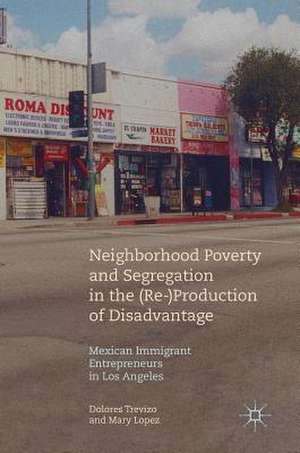Neighborhood Poverty and Segregation in the (Re-)Production of Disadvantage: Mexican Immigrant Entrepreneurs in Los Angeles
Autor Dolores Trevizo, Mary Lopezen Limba Engleză Hardback – 14 iun 2018
| Toate formatele și edițiile | Preț | Express |
|---|---|---|
| Paperback (1) | 177.70 lei 6-8 săpt. | |
| Springer International Publishing – 25 ian 2019 | 177.70 lei 6-8 săpt. | |
| Hardback (1) | 587.72 lei 6-8 săpt. | |
| Springer International Publishing – 14 iun 2018 | 587.72 lei 6-8 săpt. |
Preț: 587.72 lei
Preț vechi: 691.43 lei
-15% Nou
Puncte Express: 882
Preț estimativ în valută:
112.50€ • 122.24$ • 94.56£
112.50€ • 122.24$ • 94.56£
Carte tipărită la comandă
Livrare economică 21 aprilie-05 mai
Preluare comenzi: 021 569.72.76
Specificații
ISBN-13: 9783319737140
ISBN-10: 3319737147
Pagini: 204
Ilustrații: XVI, 211 p. 6 illus., 5 illus. in color.
Dimensiuni: 148 x 210 mm
Greutate: 0.52 kg
Ediția:1st ed. 2018
Editura: Springer International Publishing
Colecția Palgrave Macmillan
Locul publicării:Cham, Switzerland
ISBN-10: 3319737147
Pagini: 204
Ilustrații: XVI, 211 p. 6 illus., 5 illus. in color.
Dimensiuni: 148 x 210 mm
Greutate: 0.52 kg
Ediția:1st ed. 2018
Editura: Springer International Publishing
Colecția Palgrave Macmillan
Locul publicării:Cham, Switzerland
Cuprins
List of Figures
List of Tables
Preface and Acknowledgements
1. Introduction: The Social Ecology of Disadvantage for Mexican Immigrant Entrepreneurs
2. Hardline Policies, Blocked Mobility and Immigrant Entrepreneurs
3. Re-Producing Economic Inequality Across the U.S-Mexican Border
4. Mexican Segregation: Good or Bad for Business?
5. Gendered Differences Among Mexican Immigrant Shopkeepers
6. From “Illegal” to Neighborhood Shopkeeper: How Legal Capital Affects Business Performance
7. Conclusion: Making it in Business from the Outside-In
Appendices
References
Index
Notă biografică
Dolores Trevizo is Professor of Sociology at Occidental College in Los Angeles, California, USA.
Mary Lopez is Associate Professor of Economics at Occidental College, in Los Angeles, California, USA.
Textul de pe ultima copertă
Focusing on shopkeepers in Latino/a neighborhoods in Los Angeles, Dolores Trevizo and Mary Lopez reveal how neighborhood poverty affects the business performance of Mexican immigrant entrepreneurs. Their survey of shopkeepers in twenty immigrant neighborhoods demonstrates that even slightly less impoverished, multiethnic communities offer better business opportunities than do the highly impoverished, racially segregated Mexican neighborhoods of Los Angeles. Their findings reveal previously overlooked aspects of microclass, as well as “legal capital” advantages. The authors argue that even poor Mexican immigrants whose class backgrounds in Mexico imparted an entrepreneurial disposition can achieve a modicum of business success in the right (U.S.) neighborhood context, and the more quickly they build legal capital, the better their outcomes. While the authors show that the local place characteristics of neighborhoods both reflect and reproduce class and racial inequalities, they also demonstrate that the diversity of experience among Mexican immigrants living within the spatial boundaries of these communities can contribute to economic mobility.
Caracteristici
Touches on topics such as social/class stratification, sociology of work, entrepreneurship studies, inequality studies, legal capital, social capital, and immigration studies that affect a variety of disciplines
Presents fascinating case studies from 20 latino/a communities in Los Angeles
Explores explanations for different business outcomes from a variety of angles, including inter-generational knowledge transmission, social capital, legal capital, neighborhood wealth, and previous business knowledge
Presents fascinating case studies from 20 latino/a communities in Los Angeles
Explores explanations for different business outcomes from a variety of angles, including inter-generational knowledge transmission, social capital, legal capital, neighborhood wealth, and previous business knowledge
